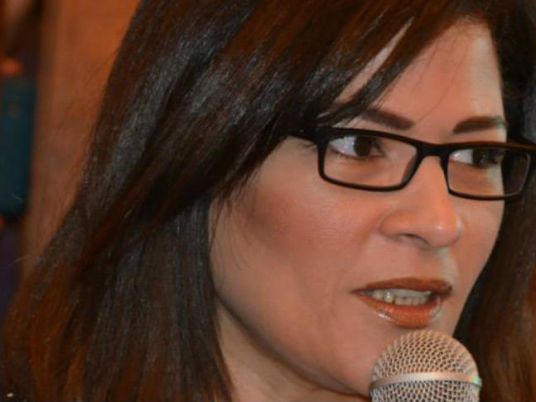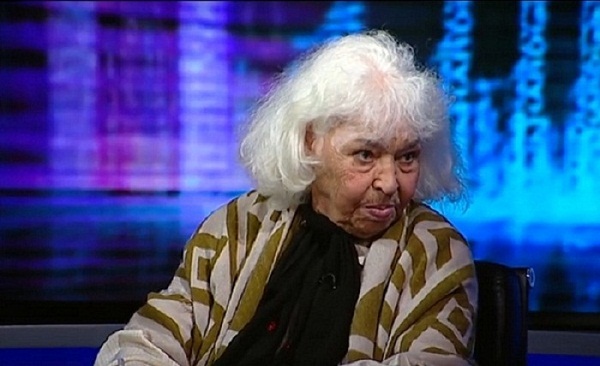
The lawyer of Egyptian writer Fatima Naoot, who faces a three-year prison sentence for contempt of religion, has vowed to file a fresh appeal after the first appeal was rejected on Thursday.
Lawyer Sherif Adib said that the decision by Cairo Misdemeanor Appeals Court on Thursday was of no consequence, because the appeal had been heard in the absense of Naoot, who was in Canada for a conference.
He said the appeal was dismissed as a matter of routine because neither he nor Naoot turned up for the hearing, and that he would file a fresh appeal within 10 days, according to standard judicial procedure.
On hearing the news on Thursday, numerous journalists and literary and artistic figures spoke out in support of Naoot, defending her right to free speech and condemning outdated laws.
Naoot was sentenced to three years in prison and a fine of LE20,000 on January 26, after a court case revolving around statements she made condemning the mass slaughter of animals during the Muslim festival of Eid al-Adha.
In October 2014, she made comments through her Facebook and Twitter accounts condemning the slaughter of sheep, but later took the comments down after a harsh reaction.
She was later arrested for contempt of religion, and while she admitted during interrogation that she had posted the statements, she denied that she had intended to insult Islam, saying that her comments did not violate Islamic Sharia.
"Happy massacre anniversary. In a while, millions of innocent beings will be escorted to the most earth-shattering massacre committed by humans for ten centuries," she wrote.
The slaughter of sheep during the feast is in memory of the Biblical story of Abraham, who was willing to slaughter his own son for the sake of God, but was given a sheep to sacrifice instead, having demonstrated his strong faith.
Naoot also wrote an article in Al-Masry Al-Youm commenting on the Biblical tale and its modern-day commemoration.
"A yearly massacre because a good man once had a nightmare about his good son, and although the nightmare has passed for the good man and his son, the [sheep] pay their lives as a price for that holy nightmare," Naoot wrote.
Moral support
After Thursday's ruling was announced in her absence, Naoot responded via Facebook, thanking the many people who had been offering her support.
She said she was "fine" and that "morale is very high, thanks to your love, which is my greatest treasure."
She added that she had just arrived at Toronto airport to take part in a conference of Canadian-Egyptian nationals, at which she would be the guest of honor during the first session.
Naoot said that she had missed the first appeal session due to her travel schedule, claiming that the court had not yet given a final ruling on her appeal, and that she would try again within 10 days.
Columnist Khaled Montasser criticized the prison sentence for contempt of religion, saying that such cases confirm that "Egypt is not a civil state but a theocratic state par excellence."
"We see religion 'brokers' and 'traders' widespread all around Egypt. We became the only religion which antagonizes the modern state. We will never have art, science or innovation as long as these ideas exist," Montasser said in a phone-in on Mehwar television channel on Thursday evening.
He continued: "Intellectuals and writers have nothing but a pen to express their opinions. Is it necessary to act like the Ultras so the president talks to us? Or do we need to deal severely with the state so that officials meet with us and solve our problems?"
Activists and writers declared their solidarity with Naoot via social media on Thursday, using a hashtag bearing her name.
Naaot's trial was preceded by the trial of actress Entissar, who was accused of inciting debauchery. Meanwhile, TV host Islam al-Beheiry was given five years in prison for contempt of religion, and writer Karam Saber was sent to jail for his collection of short stories titled "Where's God?"
Mohamed Salmawy, writer and advisor to the Arab Writers Union said of Naoot's case, "The ruling is not a mere sentence against a well-known poet and writer or a public intellectual figure. It actually reflects a disdain for renewing the religious discourse," a reference to the much-vaunted project of revising and modernizing religious attitudes in Egypt through public debate.
Salmawy said that Egypt applies archaic laws that establish a theocratic state and contradict the Constitution, claiming that the charges agaisnt Naoot are unconstitutional.
Salmawy said that the law allows for much lighter sentences than three years, or even aquittal, but the court chose to give Naoot a harsh sentence.
He said that the court's ruling suggests that Egypt is now a theocratic state, despite the fact that such a situation is supposed to have ended with the fall of the Muslim Brotherhood government in June 2013.
Meanwhle, Mohamed Faeq, the chairman of the National Council for Human Rights, refused to comment on the subject, stating that he did not wish to interfere with the work of the judiciary.
However, the said that Egyptian laws need to be changed in order to make them compatitble with the Constitution and modern thinking.
"Although we want to preserve heritage, culture, and religions, we want to move forward," he said.
Faeq demanded a specific definition of the notion of "contempt of religion" in law.
Activist Dalia Ziada commented on her Facebook account, saying that the court ruling on Thursday rejecting Naoot's appeal was the worst news she had ever heard.
"What happened to Islam al-Beheiry and many other respectful intellectuals before him because of this article is quite enough, since it harms the reputation of Egypt and is inconsistent with President Sisi's calls to reform the religious discourse," she said.
Edited translation from Al-Masry Al-Youm




